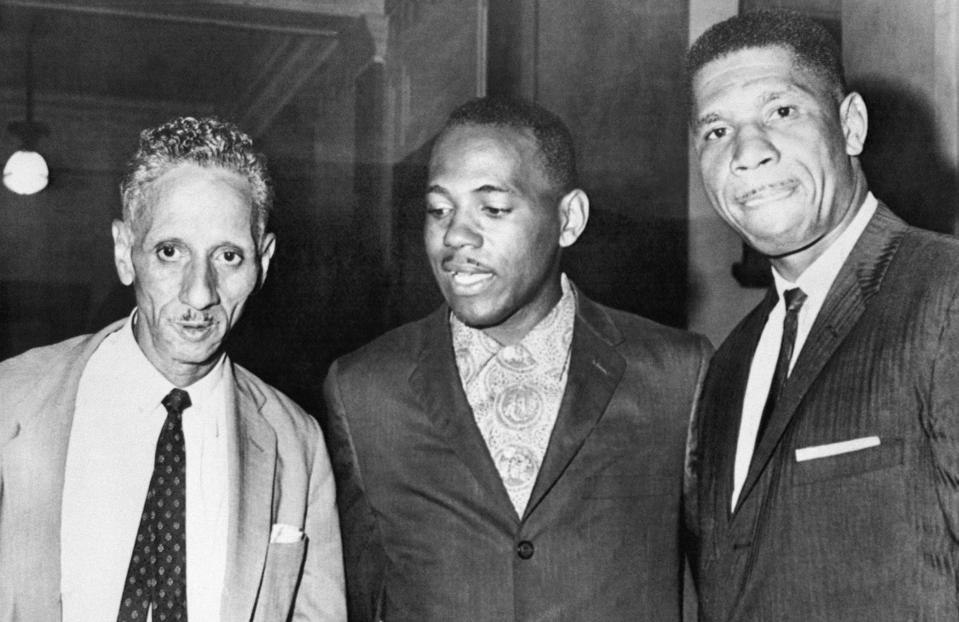Explosive request to deploy National Guard in Brockton fraught with 'historical overtones'
- Oops!Something went wrong.Please try again later.
BROCKTON — Four Brockton School Committee members set off a national firestorm by requesting that Massachusetts National Guard soldiers be deployed to Brockton High School — a school that has a student population that’s 63% Black and 85% students of color, according to Brockton Public Schools Office of Equity, Diversity, and Inclusion.
“The historical overtones of such a move are related to the fact that the National Guard was used to force Southern states to comply with racial integration," said Bridgewater State University political science Prof. Brian Frederick.
"This was the first time that I’ve ever heard of a local district asking the state to provide National Guard help. It's very rare in the history of Massachusetts and around the country,” he said.
'Makes students of color feel less safe' Brockton National Guard request especially hurtful in 'Blackest city' in MA, opponents say
The fact that the request was floated as a serious possibility raises a difficult question, he says. "Why is this particular solution, which is one many might view as an extreme step to try to maintain control of the school, being used for a school that has a majority population of students of color?"
Historically, National Guard troops have been deployed in schools at least three times to deal with civil rights issues, including at Central High School in Little Rock, Arkansas from 1957-58; at the University of Mississippi in 1962; and at the University of Alabama in 1963.
Called 16 times by the federal gov.: National Guard was activated most often during the Civil Rights Era
Desegregation of Central High School and the ‘Little Rock crisis’ (1957)
In September of 1957, three years after the U.S. Supreme Court ordered U.S. public schools be desegregated, nine Black students attempted to enroll at Central High School in Little Rock, Arkansas.
However, the Arkansas National Guard, who had been called out by Gov. Orval Faubus, denied the Black students entry, according to the National Archives.
Brockton on Fox News Brockton thrust into national spotlight over call to deploy National Guard at high school
President Dwight D. Eisenhower got involved, suggesting that Faubus continue to deploy the National Guard troops but to allow the Black students to enter the school. Instead, Faubus withdrew the troops entirely. Without the troops' presence, a full-scale riot erupted when the nine students attempted to re-enter the school and they were forced to evacuate, according to the National Museum of African American History and Culture.
Eisenhower issued Executive Order 10730, placing the Arkansas National Guard under federal control, and sent 1,000 U.S. Army paratroopers from the 101st Airborne Division to assist in restoring order in Little Rock, according to the National Archives.
The next day, on Sept. 25, the nine Black students successfully entered the school under the protection of the Arkansas National Guard.
'Bring him back' At explosive Brockton school board meeting superintendent tears into mayor
Desegregation of the University of Mississippi and the Ole Miss riot (1962)
James H. Meredith, a former serviceman in the U.S. Air Force and a student at the all-Black Jackson State College, applied and was accepted to the University of Mississippi in 1962. But when Meredith attempted to register for classes, he was denied entry by Mississippi Gov. Ross Barnett, according to reporting by History.com.
Two days later, U.S. Marshals attempted to escort Meredith onto the Ole Miss campus, but he was turned back by a deadly riot that killed two men and injured more than 300, according to NPR.

President John F. Kennedy activated the Mississippi National Guard and called in Army troops from Memphis, Tennessee to stop the violence. The next day, Meredith returned to the school and successfully began classes.
'You failed at your jobs' Brockton parents tear into school board over deficit
Desegregation at the University of Alabama in Tuscaloosa (1963)
On May 16, 1963, a federal district court in Alabama ordered the University of Alabama to admit Black students Vivien Malone and James Hood to its summer session.
Under the authority of President John F. Kennedy, Malone and Hood were accompanied by the Alabama National Guard and federal marshals as they registered for classes, according to the Civil Rights Digital Library.
When the two students tried to enter the Foster Auditorium building to register, Alabama Gov. George C. Wallace, who had campaigned against the U.S. Supreme Court’s desegregation ruling, refused them entry by physically blocking the entrance.
When Wallace refused the students entry, Kennedy authorized the National Guard to remove him and the students were able to successfully register.
.
This article originally appeared on The Enterprise: National Guard deployed to help — and hinder — school desegregation

